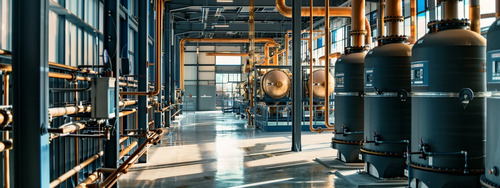Water is a critical component in nearly every industrial operation, from manufacturing to power generation. The quality of water used in these processes can directly affect efficiency, safety, and the bottom line. Investing in a reliable water treatment solution is therefore not just a matter of regulatory compliance, but also a strategic decision that impacts the entire operation. By focusing on quality water treatment systems, industries can ensure that they are both protecting the environment and optimizing their processes. Keep reading to delve into the significance of water quality and the value of high-grade treatment solutions in industrial settings.
The Impact of Water Quality on Industrial Operations
Water quality is critical for industrial operations, as impurities like minerals, bacteria, and other contaminants can damage equipment through corrosion, scaling, or fouling. These problems shorten machinery lifespan, raise maintenance costs, and cause costly downtime. In industries such as pharmaceuticals, food and beverage, and electronics, even small variations in water quality can impact product consistency, risking brand reputation and competitiveness.
For high-pressure systems like boilers, poor water quality reduces efficiency, increases fuel use, and raises emissions, driving up costs and environmental concerns. Choosing the best industrial water treatment system ensures compliance with standards, protects equipment, supports product quality, and aligns operations with sustainability goals.
Risks Associated with Poor Water Treatment in Industry
Poor water treatment exposes businesses to serious risks, from health hazards to environmental damage. Untreated or improperly treated water can harbor harmful bacteria or chemicals, threatening employees and end consumers while creating legal liabilities and reputational harm. Discharging wastewater with heavy metals or toxins devastates ecosystems, often resulting in costly fines and remediation requirements that strain resources and credibility.
Beyond compliance, neglected water quality drives up operational costs. Corrosion, scaling, and fouling shorten equipment lifespan, requiring frequent repairs or replacements. Systems running on poor-quality water also consume more energy, hurting profit margins and sustainability performance. In severe cases, production may halt entirely due to breakdowns or regulatory shutdowns, a blow especially damaging to smaller firms.
The Economic Benefits of High-Quality Water Treatment Solutions
Investing in advanced industrial water treatment delivers clear financial benefits by reducing equipment failures, repair expenses, and premature replacements. With fewer disruptions and extended machinery life, companies save on both maintenance and capital costs. Cleaner water also supports smoother operations, allowing production cycles to run faster and more efficiently. These performance gains help offset initial investment, making water treatment a cost-effective strategy in the long run.
Innovative systems add further value through recycling and resource recovery. By reclaiming water and converting waste into energy or reusable materials, businesses cut purchasing and disposal costs while generating new revenue streams. Adopting sustainable treatment practices also strengthens market position, attracting environmentally conscious consumers and investors.
Advancements in Water Treatment Technology for Industrial Applications
Technological innovations in water treatment are transforming industrial operations through advanced purification methods and smart integration. Systems using reverse osmosis and ultraviolet disinfection deliver higher purity standards, meeting strict industry requirements. The addition of connected sensors enables real-time monitoring, maintaining water quality consistency, and supporting predictive maintenance to reduce downtime and equipment failures.
Modern designs also emphasize adaptability, energy efficiency, and sustainability. Modular systems allow industries to scale capacity with shifting production needs, avoiding inefficiencies from underused or overloaded units. At the same time, energy-conscious models consume less power, cut emissions, and align with environmental regulations, making them both cost-effective and eco-friendly choices for industries seeking reliable water solutions.
Strategies for Selecting the Right Water Treatment Provider for Your Business
Choosing the right water treatment provider requires a clear understanding of your business’s water quality standards and usage demands. Matching these needs with a provider’s expertise ensures an efficient system tailored to your operations. Key factors include proven industry experience, strong reputation, and robust after-sales support. Providers who offer maintenance and monitoring services bring additional value by helping prevent costly downtime.
Innovation and financial planning also play critical roles. Providers with a track record of adopting emerging technologies deliver adaptable, sustainable solutions that keep businesses compliant and future-ready. Equally important is cost structure—covering installation, operation, and maintenance—where the best providers offer predictable expenses and demonstrate long-term savings.
Overall, the investment in a top-tier industrial water treatment solution is not only a strategic but also an ethical imperative. Beyond complying with environmental regulations and safeguarding public health, it contributes to business resilience and prosperity. A commitment to quality water treatment is a testament to a company’s dedication to excellence, sustainability, and a progressive outlook in an ever-evolving industrial landscape.



